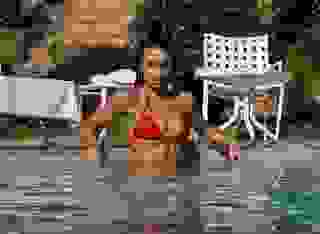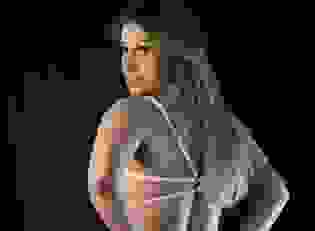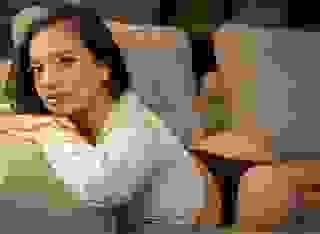Note: You can change font size, font face, and turn on dark mode by clicking the "A" icon tab in the Story Info Box.
You can temporarily switch back to a Classic Literotica® experience during our ongoing public Beta testing. Please consider leaving feedback on issues you experience or suggest improvements.
Click hereAfter a while Shane said, "I'm sorry."
Harvey sighed. "I am, too, Shane. I am, too."
After a while, Harvey said, "I put some things for you in the guest bedroom."
When Shane went in later she found shopping bags on the bed. There was a six-pack of jockey underpants, assorted colors, in her size. Three T-shirts, two men's button-down dress shirts. Two pairs of jeans, one in normal condition and one in great condition, with holes and tears and rips and the proper fading. A pair of flip-flops and a pair of sneakers. A modest, non-racy bikini. A bag from the Walgreen's at the corner of Wilshire and Dunsmuir contained deodorant, a toothbrush, toothpaste, maxipads, a bottle of vitamins, shampoo, hair conditioner, sun block, and the latest editions of Wired and Rolling Stone.
Shane buried her face in one of the T-shirts and found herself crying, she didn't know why.
***
The next morning Shane was lying on the chaise lounge on the far side of the pool, wrapped in her terrycloth robe and curled up in the fetal position. Her face hurt, her body hurt, her spirit hurt.
She heard the sliding glass door to the house open, but paid no attention. Then she heard Harvey's voice talking quietly to someone, and she opened one eye. Harvey was standing by the door and talking to a short, thin woman in her late 50s or early 60s. The woman wore slacks and a blazer. She wore her gray hair in a bun and had her glasses parked up on top of her head. She watched Harvey and the woman talk for a minute, and then Harvey gestured the woman over toward Shane, something like, There she is, good luck. Shane watched Harvey go back inside the house as the woman walked around the pool and came over to her. The woman pulled another chaise over and sat down on the edge of it, and regarded Shane. Shane sat up and faced her.
"Hi, Shane," the woman said. "My name is Carol Berlinger. I'm a friend of Harvey's. I'm basically a headshrinker, I do rape counseling, post-traumatic stress disorder, that sort of thing. I don't normally make house calls, but, well, Harvey is such a mensch, I couldn't resist his request for help. Harvey says that something pretty awful happened to you, and so you and I have a lot of work to do."
***
Three days later when Harvey came home from rehearsal Shane was lying on the chaise lounge in her terrycloth robe in the fetal position. She had met with Carol Beringer every day for an hour, not that Shane had done much talking. Carol did a lot of it, explaining a lot of things to Shane, and paying no attention to Shane's apparent indifference. Carol understood that it was going to take a long time for Shane to start to open up, and Shane seemed to accept that. Harvey had also taken Shane back to the health clinic every day for check-ups.
Harvey came out of the house and walked around the pool and sat down in the chaise next to Shane.
"Want a beer?"
Shane opened her eyes and saw Harvey had two of them, and was offering her one.
"Of course, if you report me to Child Protective Services for attempting to corrupt a minor with alcohol, I'm going to be pissed," Harvey said.
Shane uncurled, took the beer from him, murmured "Thanks," almost inaudibly, and sat upright on the chaise. They looked out over the valley and over the city into what would soon be sunset.
"I've got an idea," Harvey said.
Shane said nothing.
"You're what, nineteen years old? I'm guessing you never graduated from high school, am I right? Ran away from whatever it was you ran away from. I'm guessing you have no place else in the world to go, no place to take you in. No family, at least not one you'd go to for help or shelter. No friends, not of any account. No big brother or big sister to help you out, maybe take you in. You have no marketable skills that don't involve exchanging sex for money. And until your face heals up, which is probably gonna be a couple of weeks, from what the doctor said, you can't even do that."
"So I'm thinking, what are we going do with this girl, this orphan. By 'we' I mean you and me, Shane, because you and me is all there is in this world right now. So what I think is, we need to get you a job. Some sort of job that may allow you to eventually support yourself. And to do that you're going to need some sort of career training, because you can get a job supersizing french fries, but there is no upward mobility in the fast food industry, no career path, no health insurance, no 401K plan for up-and-coming julienned spud technicians. So here's what I'm thinking. I'd like you to take a couple days, even longer if you need it, and think about what career you might be willing to go into. And when you've thought of one, we'll do a little research, find out how to get you started. Some sort of vocational school. I don't care what the career is. Legal secretary, stenographer, receptionist, hairdresser, cosmetology, culinary science, chef school, x-ray technician. Law school. Machine gunner in the French Foreign Legion. Whatever. You decide. And I'll finance the schooling, whatever it is. You'll live here, do chores around the place for your upkeep, and go to this vocational school. And then when you graduate, you get a job. Does that sound like a plan?"
"Why would you do all this for me?" Shane asked.
"Because when you were in a lot of trouble, in the worst trouble of your life, most likely, there was only one person you thought of to call for help. That person was me. And do you know why you called me?"
"No. Not really."
"It was because, in the worst moment of your life, your instincts picked out the one person you knew, even casually, who might help. You picked maybe the only person in your small circle of acquaintances who wasn't a predator. All because I bought you a cup of coffee and a sandwich at Starbucks."
"I don't get it."
"It proves you can sometimes make good decisions, Shane. That you aren't totally self-destructive. It proves that in a crisis, you can come up with the right answer. It proves that down at some animal level where most of us operate, you recognized there was some other person out there who wouldn't hurt you. And you were right. What it proves is, Shane McCutcheon is someone worth saving and someone who can be saved. Not everyone can be saved -- but you can be. So that's what we're going to do. We're going to make you a fully functioning adult."
"I don't know what to say," Shane said.
"Don't say anything. That's not your style, anyway. But you keep working on this question in your head, that's what you do. And in a couple of days you'll know the right answer. And then we'll talk again. Okay?"
"Okay."
"In the meantime, what do you want for dinner?"
***
Two days later Shane and Harvey were eating breakfast at the counter in the big kitchen, and watching the Today Show.
"Want some more coffee?"
Shane nodded. Harvey got up, brought the pot over, and refilled his mug and Shane's mug.
"Hairdressing school," Shane said.
"Okay," Harvey said.
***
Four days later they went to the Halliday School of Beauty on Wiltshire. It had been recommended by three female members of Harvey's orchestra, who had their hair done by hairdresses who graduated from there. Carol Berlinger's receptionist knew the place and said her daughter had gone there. Barbara Cranshaw's neice knew somebody who had a friend who said the place was pretty good.
"What do you think?" Shane asked Harvey.
"I think if you don't like it we'll try someplace else, that's all," Harvey said.
They talked to the man who ran the place, and while Shane got a tour of the facilities by one of the students, Harvey gave the man his credit card and paid for the eight-month course and all the books and supplies Shane would need. American Express: Don't Leave Home Without It. The next class started in three weeks.
Driving home, Shane said, "I'll pay you back. I don't know when. But I will."
Harvey glanced at her. "Okay. But there's no hurry."
A mile further on Harvey pulled into the parking lot of a big used car dealership, and parked in front of the main office. Shane looked over at him.
"You need a way to get back and forth to school," Harvey explained. "I'm not schlepping you back and forth every day for the next eight months, you know. I've got rehearsals and concerts, and we'll be on tour at least two or three times during that period. You need to be able to transport yourself."
A salesman came out of the office and approached Harvey's Mercedes. "What can I show you folks today?" he asked.
"Something in good condition, reliable, for my daughter, here. Less than 70,000 miles on it. Good tires. To take her back and forth to school. No Lamborghinis, no Rolls Royces. Something simple and basic."
"Harvey, can I tell you something?" Shane asked. Harvey leaned over and Shane whispered in his ear, "I don't know how to drive. I've never driven a car in my life."
Harvey looked at her. "You know, I never stopped to think about that, but you're right. But never mind, you've got three weeks to learn."
The salesman took them around the lot, looking at domestic and foreign compact cars. They looked at a few of the least expensive models, but Shane didn't see anything that caught her fancy. And then she looked over and saw it. At one end of the lot there were the pickup trucks and work vans. And there was a small Toyota pickup truck, dark green. It had seen better days, cosmetically, but appeared to be clean and well maintained. It had 63,000 miles on it. It was butch enough, it said "Shane."
"What do you think?" Harvey asked Shane. "Is this the one?"
Shane sat in the driver's seat. Harvey could tell from her face. "You got the keys? Can we take her around the block?" he asked the salesman.
"Be right back," the salesman said.
After the test ride they sat in the office and Harvey did the paperwork. He handed the salesman his American Express card. Don't Leave Home Without It.
***
After the first few house calls by the pool, Shane saw Carol Beringer once a week in Carol's office. The sessions were rough, and Shane was a bad patient, sullen, uncommunicative, untrusting. Shane tried to be tough and unemotional, but for no reason she knew of she'd sometimes burst into tears. Sometimes Harvey would pick her up after a session and Shane would get in the car, curl up against the passenger door, say nothing, and go straight to her room and close the door and disappear until the following morning. When she did that, he'd make her a dinner tray and take it to her room. He'd knock on the door, and when there was still no answer he'd open the door and go in. The room would be dark, and Shane would be huddled on the bed, her back to him. He'd leave the tray on the dresser. "I made some meatloaf," he'd say, and then leave quietly. Sometime during the night, the tray would be delivered to the kitchen, the dishes and silverware washed and put away. Harvey never knew how much she'd eaten, but apparently it had been enough, because she didn't seem malnourished. And she didn't die on him from famine, so that was good, too.
Carol was patient and persevering. Shane wasn't the most difficult patient she'd ever had – but she was close. In some ways, the rape was only the tip of the iceberg, only the last in a series of horrific life experiences, and it took weeks for Carol to draw out the simplest details: Shane was born in Austin, Texas, but never knew her father. Her mother was an on-again, off-again drug addict who hung around the fringes of the college scene at the University of Texas. She raised Shane, with the help of some relatives and also the county social services division, the police, the courts, the church, whoever could offer something. For a year they lived in Houston, crashing at the house of friend. Shane went to school there, and they lived off "Sunshine Meals" delivered to shut-ins by a local church group; Shane's mother had lied to get the assistance, claiming to be wheelchair-bound and apartment-bound.
Shane had one vivid memory for Carol, telling her about the time when she was eight years old. She had taken her Sunshine Meal across the street to a local playground, and was eating her lunch when another little girl caught her eye. The little girl's name was Tiffany Gardner, and Shane fell madly in love with her. From that moment on, Shane knew there was something different about herself, something she couldn't name and knew nothing about. Whatever it was, Tiffany had it too. This Shane knew somewhere down at the core of her being. She shared her Sunshine Meal with Tiffany Gardner that day, and on a number of days thereafter. Shane and Tiffany understood each other. Metaphorically, it might be said that they could complete each other's sentences, but neither of them spoke much, so it would be more apt to say they completed each other's grunts and silences. Tiffany was also from a poor, broken family. They sensed they were two halves of a single broken thing, a broken pitcher, a broken plate. Put the two halves together and you have a whole object, albeit it a damaged one that was chipped and cracked and glued back together. They discovered they sensed each other's moods and thoughts and cares on some other level beyond language. They followed each other around the neighborhood, neither one being the leader of the other, nor the follower. They were also unlike many other little girls, in that they seldom played with dolls, weren't catty and bitchy, and absent close role models, never became especially feminine, which at age eight passed unnoticed and unremarked in their environments; there was nothing unusual about a couple of tomboys. They were simply Shane and Tiffy, two peas in a pod dressed in well-worn Oshkosh overalls from the Salvation Army store, and they had no room for and no interest in any other peas or any other pods, just two more unadoptable Cabbage Patch kids with no last names in life's Toys 'R Us warehouse. Tiffy and Shane, Timmy and Lassie. Or Bert and Ernie. Or Ernie and Bert.
When Shane was nine, her mother was arrested and convicted of check-kiting, and before she went to prison she managed to get Shane placed in a foster home in Bluff Springs, back in Austin's suburbs. The foster family were okay people, kind and caring, but they weren't "real" parents, and anyway they were handling a child who was almost feral by this point. Shane pined away, which her foster family assumed was for her mother, and to some extent it was, but it was for Tiffy Gardner, too. Relationships: They will fuck you up and break your heart and hurt you, and you won't even know when or why or how. That was what Shane learned.
Up to that point in her life, Shane had been a fairly good student, at least on those days she managed to attend. She liked to read, and maintained her appropriate reading level. Being shy and quiet, she was never much of a discipline problem, though she liked to do things her own way. But after the move to the foster home and the loss of both her mother and Tiffany, things went to hell. The teacher in the new school had no knowledge of Shane's abilities, and only was able to see the child before her. That child was inarticulate and seemed perpetually dazed and confused, and often irritable and angry, acting out. She seemed unable to concentrate. She seemed unable to read much, because her attention wandered. Without putting much effort into it, the teacher concluded Shane just wasn't very bright, and this message Shane herself began to believe. It just happened to be wrong.
One afternoon Shane's behavior was a bit more distracted than usual. She prowled around Carol's office, brooded out the window – to no one's surprise Shane refused always to lie down on the couch to have her head shrunk in the traditional manner – sat on the floor with her back to the door. They were talking about Shane's years in Texas, and Shane was having trouble even completing sentences.
Suddenly Carol sat up. "Shane, I'm sorry to interrupt...but is there something wrong? Something specific to today? You are acting...unusual."
Shane looked at Carol.
"Are you on any medications today? Any drugs of any kind? You seem spaced out."
"Nothing," Shane said. "Honest."
"Okay. I'm sorry I stopped you. We were talking about Texas."
"I... um...there is something. Can I ask you a question?"
"Sure."
"Like, it's a medical question. Not medical, but like, in the brain stuff."
"Like what?"
"Do all people have this noise in their heads? Because there was this girl in class today who said she liked to listen to music while she worked to fill up the silence in her head. And I thought, 'what silence?' Because I never hear any silence. All I ever hear is this kind of noise."
Carol wrinkled her brow. "Do you hear voices? People talking to you?"
"Mmm, no. Nothing like that. It's just ... it's like static, in a way. Just all this jumble of ideas and thoughts, and stuff, coming at me. All this stuff all the time, and I don't know what to do with it. And sometimes I just want to get away from it, make it stop, go away, just so I can have some peace and quiet."
"Before the rape, before the nightmares, did you have trouble falling asleep at night? What was your normal pattern when you got into bed? Not just in the last year or two, even. Just as far back as you remember."
"I don't know. What's normal, you know? But yeah, I often laid awake trying to sleep, trying to get my mind to turn off."
"I have an idea about you, something I thought of a few times before, from things you've said. I'd like to try an experiment. Would you do me a favor and come sit in the chair here?"
Shane slowly got up and came and sat in the chair in front of Carol's desk.
"Sit up straight, but relaxed. Close your eyes." Shane complied.
"What color are the curtains?"
"Huh?"
"What color are the curtains?"
"Uh, they're blue. Kind of a turquoise color, maybe a little darker, with streaks in them, a purple color streak, and some orange. Kind of a Southwestern thing, kinda Tex-Mex, I guess."
"That's right. Where is my purse?"
"Hanging on the doorknob of the closet."
"Right. Describe it. Don't open your eyes."
"Um. It's tan leather, natural kind of color. Not too big. Got a regular leather shoulder strap. It has a side pocket with your cell phone in it. On the flap the word 'Coach' is embossed in it."
"What magazines are in the waiting room?"
"Architectural Digest. Elle. People. Psychology Today. Los Angeles magazine. Sports Illustrated, three copies. Then there's—"
"That's fine. Do you know anything about architecture?"
"No."
"Do you have any interest in it?"
"No."
"What is on the cover of Architectural Digest?"
"Uh, I don't know. A dining room, somebody's dining room."
"Describe it."
"I didn't look at it."
"Yes, you did. You already know it's a dining room. Describe it."
Shane closed her eyes, concentrated. "White walls, stucco, like a Spanish mission or something. Black wrought iron chandelier, black candle holders. Big table, very dark wood, that Spanish look. Table setting for, like, eight or ten people, I guess. The far end is open to the living room and beyond that you can see the ocean. But it's on a hill, not down on the water."
"That's outstanding," Carol said. "Now, in one word, describe Harvey."
"Lonely," Shane said instantaneously.
Carol sat, stunned. "That's amazing," she said.
"He misses Jack," Shane said.
"Did he tell you that?"
"No, he never said anything. I mean, he told me that Jack had come home and swum out into the ocean. Committed suicide, I guess. But he didn't say how he felt about it."
"But somehow you knew."
"There's pictures of him, or of him and Harvey, all over the house. He kept all of Jack's stuff."








